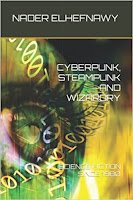I will be blunt--I haven't bothered to even try to look at the Oscar ceremony in more years than I will bother to bespeak (given that it would, of course, indicate just how old I am getting to be). Why bother, after all, when no real-life Oscar ceremony is anywhere near as entertaining as, for instance, the last act of the last of the Brooks-ZAZ wave of gag comedies that was actually funny, The Naked Gun 33 1/3rd?
Still, I do tend to check out the list of wins and losses the next day--and of course, check out film critic David Walsh's annual reportage on the event, the principal theme of which is usually the pretension, backwardness, hypocrisy and sheer stupidity of the Academy, Hollywood and the cultural elite of which they are a part (again, with this criticism usually more illuminating and entertaining than anything the ceremony offers--with Mr. Walsh not disappointing this year).
This year such thoughts as I have had about the ceremony have to do mainly with the movie that swept the awards, Everything Everywhere All at Once (EEAAO from here on out so I don't have to keep writing out the full title)--picking up Best Picture, Best Director, Best Original Screenplay and three of the four acting prizes (a near-perfect sweep save for Brendan Fraser's win for The Whale). At a glance EEAAO seems an unlikely contender for such an award, given that it not only has a sci-fi premise, and that of the more head-spinning variety, but, in even more pointed contrast with such prior sci-fi-tinged Oscar darlings as Michel Gondry's The Eternal Sunshine of the Spotless Mind (2004) or Spike Jonze's Her (2014) or Guillermo del Toro's The Shape of Water (2017) it has a conventional action-adventure premise (however unconventionally realized in respects).
For all that I still suspected it had the best shot at the key prizes. After all, it was the most popular of the movies not included as sops to the broader public which everyone knows cannot win much outside the technical categories (Top Gun 2, Avatar 2) in a moment in which popularity counts for even more than usual--with the film industry more than usually anxious about its survival after three financially catastrophic years, with the franchises so long carrying it looking ever more creaky, with the Academy in particular fearful of a declining relevance that has only got worse in the decade since I took up the theme a decade ago. The movie ticked off a fair number of the "wokeness" boxes. (Not every one of them, of course--the "status politics" of identity are by definition very zero-sum, and sheer mathematics makes it impossible to please everyone all the time, but all the same, it scored a lot of points this way.) The same factor makes it unlikely that a movie with a less than wholeheartedly cheerleading attitude toward #MeToo (hobbling at least one competitor). And there is the other kind of politics, where, for all of the culture war hyperbole, a Hollywood that has pretty much always tended to be "safe" and conservative on most of the issues that mean something in actual people's lives is ever more "safe" and conservative--such that a foreign-language adaptation of an "anti-war" classic depicting the horrors of trench-and-artillery barrage warfare in the fields of northern Europe during a world war seems a very unlikely Best Picture winner these days (ruling out what many seem to have regarded as its worthiest rival, relegated instead to the far less prestigious Best Foreign Language Feature category).
There also seems to have been a certain genuine affection and respect for the movie from even those who are not martial arts-loving "lowbrows," something a Best Picture winner ought to have, of course--though this kind of thing usually seems to come in last for consideration. Alas, such is Hollywood life in March 2023.
Subscribe to:
Post Comments (Atom)


No comments:
Post a Comment